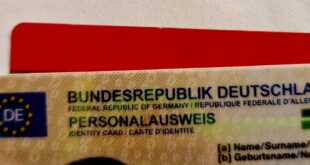Like in every new month, new laws and regulations enter into force in Germany in November. These affect quarantine rules for travellers, the labelling of food products, vehicle insurance, change of tax class and ID card for EU citizens living in Germany, among others. Here’s an overview of the changes:
—–
Corona-Lockdown
From 2 November, new corona restrictions will apply throughout Germany until the end of the month. Click here for the new “lockdown light” measures.
—-
New quarantine regulation for returnees on entry from risk areas
New quarantine rules apply to returnees from foreign corona risk areas from 8 November: Anyone who has been in a country or region classified as a risk area (Risikogebiet) during the ten days before returning to Germany must go into self-isolation for ten days immediately after their return and must also report to the health authorities. If you want to end the quarantine prematurely, you can have a corona test at the earliest five days after entering the country. The quarantine ends when the test is negative. However, if Covid-19 symptoms appear within ten days of the test, the person must go to a doctor or a test centre to have another test carried out.
The new quarantine regulation provides for a reduction of the quarantine period from 14 to 10 days. The entry declaration for returnees will be available online from 8 November.
—-
Start of the Nutri-Score
The “Nutri-Score” may be printed on the packaging of food products from November onwards.
In order to make “fatteners” and healthy food more easily recognisable in the supermarket, the new “Nutri-Score” logo will be launched across the board from November. In addition to sugar, fat and salt, an overall score will also include recommended ingredients such as fibre and protein. These are then displayed on a five-digit traffic light scale on the front of the pack: from “A” on a dark green field for the most favourable balance, through a yellow “C” to a red “E” for the least favourable. The new colour logo on food packaging is intended to help consumers to recognise healthy and unhealthy foods more easily.
The labelling is, however, not mandatory; its use is voluntary and lies with the manufacturer.
—-
Less chemicals in textiles
From November onwards, the use of various chemicals in textile production will be restricted or even banned. Thirty-three substances that are known or suspected to be carcinogenic will be subject to stricter limits on their use in textiles – including arsenic, lead, benzene, cadmium, chromium and others.
—-
Change of tax class
Married couples may apply for a change of tax class for the calendar year 2020 by 30 November 2020 at the latest. The change is only possible once a year and must be submitted in paper form to the tax office or on the website of the Federal Ministry of Finance. For income from employment in Germany, the wage tax class determines the wage tax deduction as well as the deduction of the solidarity surcharge and, if applicable, church tax. The Income Tax Act recognises six wage tax classes, which depend primarily on marital status.
READ ALSO Corona Lockdown: These rules apply in Germany in November
—-
Change of car insurance company in November
November 30 is the annual deadline for the change of car insurance. This is because notice of termination of an insurance contract must be given up to one month before the end of the contract’s term and the vast majority of contracts run until the end of December. Without notice of termination, the insurance is extended by one year.
The vehicle tax is now more strongly oriented towards the pollutant emissions of the vehicles. It increases gradually with the level of emissions. In contrast, owners of purely electric cars will receive tax relief. The German government is thus sending a clear signal of its preference for climate-friendly and affordable mobility.
But despite all the temptations to save money, experts warn that when choosing an insurance policy, there are a number of things to consider due to the substantial differences in price and service. A change should therefore be well considered. One should be aware of the scope of insurance and possible savings in benefits.
—-
New identity card for all EU citizens in Germany
EU citizens will be able to obtain eID cards from German passport and administrative authorities from 2 November 2020. This will eliminate the need to go to their consulate or embassy. However, the eID card does not replace the identity card or passport. Rather, it can be used to identify oneself on the Internet in order to take out a loan across borders if necessary. The eID card can be obtained by presenting a registration certificate and a travel document and paying a fee of 30 euros.
—-
Opening of new Berlin airport
After a delay of nine years, the Berlin Brandenburg Airport (BER) finally opened on 31 October 2020. During the first week of November, air traffic at BER will gradually be ramped up so that the airport can be fully utilised from 8 November onwards. With the opening of the BER, Tegel airport will be closed on 8 November.
Femi Awoniyi
 THE AFRICAN COURIER. Reporting Africa and its Diaspora! The African Courier is an international magazine published in Germany to report on Africa and the Diaspora African experience. The first issue of the bimonthly magazine appeared on the newsstands on 15 February 1998. The African Courier is a communication forum for European-African political, economic and cultural exchanges, and a voice for Africa in Europe.
THE AFRICAN COURIER. Reporting Africa and its Diaspora! The African Courier is an international magazine published in Germany to report on Africa and the Diaspora African experience. The first issue of the bimonthly magazine appeared on the newsstands on 15 February 1998. The African Courier is a communication forum for European-African political, economic and cultural exchanges, and a voice for Africa in Europe.


































